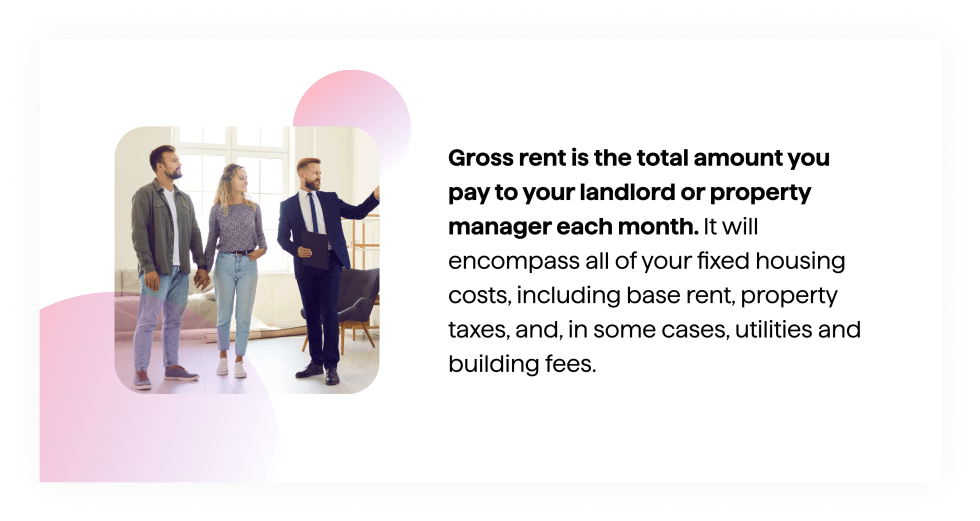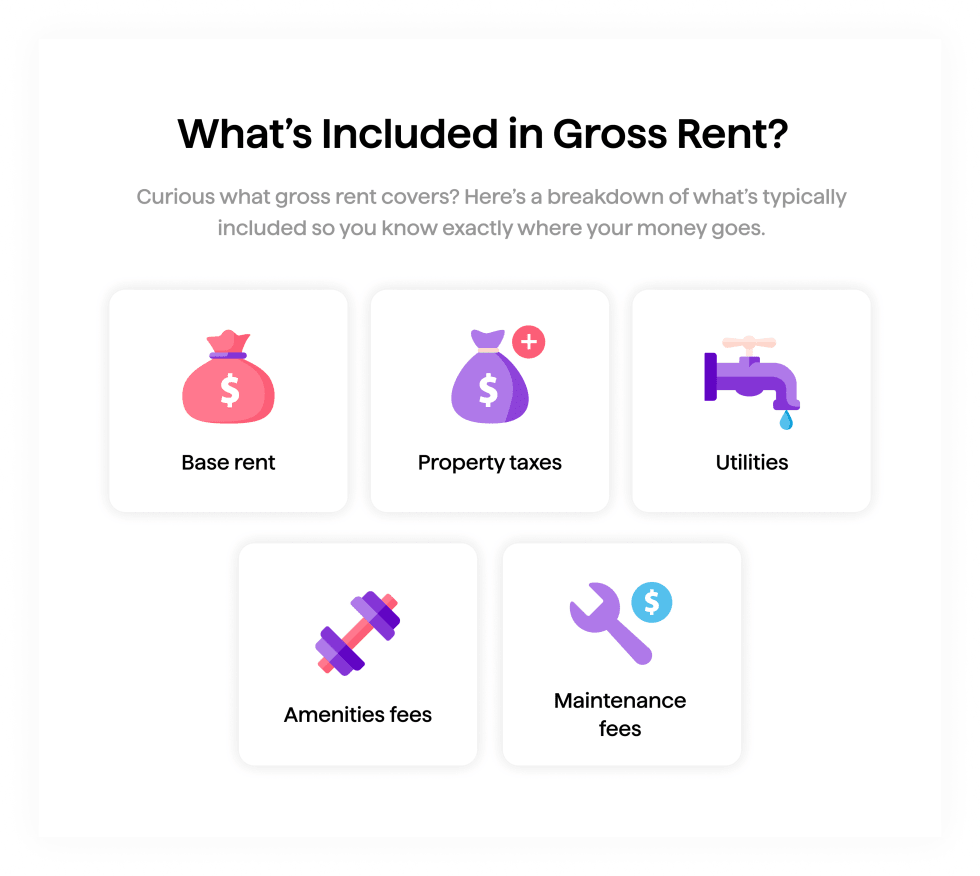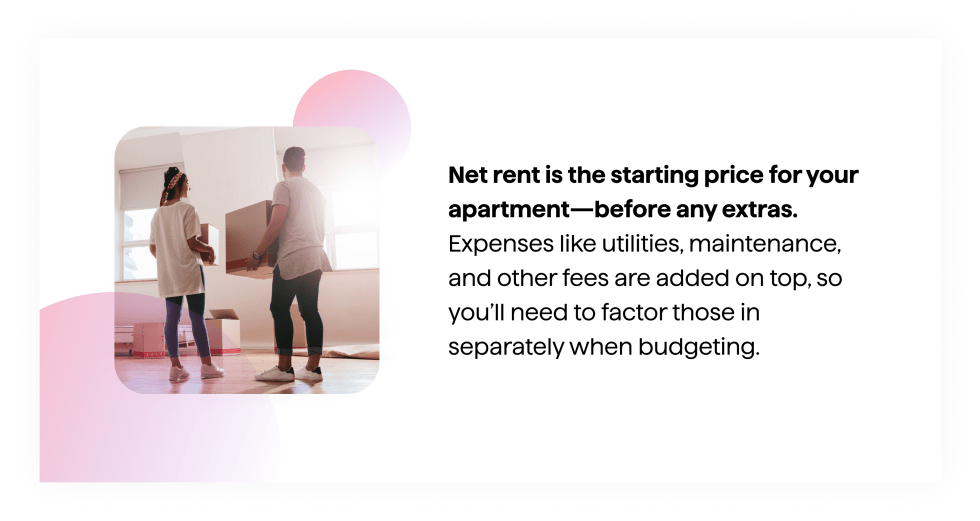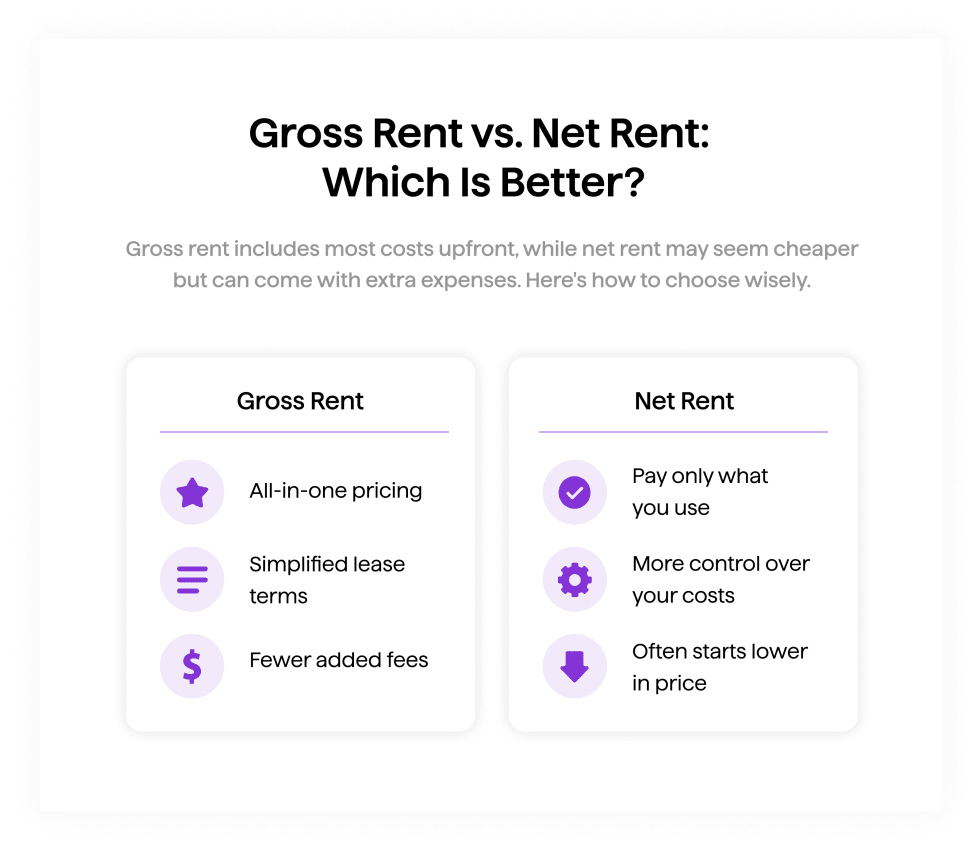Gross Rent vs. Net Rent: What's the Difference?

Trying to figure out the difference between gross rent vs. net rent? Renting an apartment is more than signing a lease and figuring out how to budget for rent and utilities. It’s also important to know the terms "gross rent" and "net rent" and the impact they make on your wallet.
If you’re a renter, knowing the difference can help you plan and avoid unexpected costs to keep your monthly expenses in check. We did all the research for you to answer the question of gross rent vs. net rent to put you on the right track for your next apartment.
Gross Rent vs. Net Rent Breakdown
What Is Gross Rent?
Gross rent is the total amount you pay to your landlord or property manager each month. It will encompass all of your fixed housing costs, including base rent, property taxes, and, in some cases, utilities and building fees. When you see an apartment listed with "gross rent," it means there are no additional charges beyond that set monthly amount unless stated otherwise.

What Does Gross Rent Include?
In most cases, your gross rent will include:
- Base rent: The cost of your space.
- Maintenance fees: Some landlords will include building upkeep costs in the gross rent.
- Utilities: Landlords may also include the cost of water, heat, or electricity.
- Amenities fees: Your gross rent may also include amenities, such as a gym, laundry, or security.
- Property taxes: The property taxes of the apartment or single-family home you’re renting may be factored into your rent.
Gross rent doesn’t always cover all the rent fees you’ll pay for your apartment. It’s important to look over your lease agreement to determine exactly what it covers.

Benefits of Gross Rent for Renters
Renters may prefer gross rent over net rent for the perks it offers. There are predictable monthly costs that make it easier to budget and plan. You also won’t have as many details to go over in your lease agreement in terms of additional fees and charges.
What Is Net Rent?
Net rent is the base rent amount before adding in any extra expenses. It doesn’t include utility costs, maintenance fees, or other charges. Renters will need to pay all of these things separately, which may make organizing your finances more complicated.

What Additional Costs Do You Pay with Net Rent?
If you’re a first-time renter, here are some of the costs you’ll need to consider when paying net rent.
- Utilities: Electricity, gas, and water.
- Maintenance fees: Paying maintenance fees is sometimes required by your lease.
- Property taxes: It’s not the norm, but property taxes may be passed on to the renter.
- Building fees: Building fees and amenities are often paid by the renter.
Every lease looks different, so it’s important to review your agreement to see what you’ll be paying.
Why Do Some Landlords Use Net Rent?
There are some reasons why landlords prefer to use net rent over gross rent:
- Transparency: Net rent shows the base cost of the apartment.
- Flexibility: Renters may only pay for the amenities they use. For example, a renter may not be required to pay a fee for laundry or an on-site gym until they use it.
- Competitive pricing: Apartments may seem cheaper to renters at a glance.
It’s important to ask if the landlord is advertising gross or net rent before making a decision about whether your budget can sustain the apartment.
How to Compare Gross Rent vs. Net Rent
An apartment with a lower net rent might seem like a great deal, but if you’re responsible for utilities, taxes, and fees, it could end up costing more than an apartment with gross rent.
Questions to Ask Your Landlord or Leasing Office
If you’re not sure how to approach your apartment search, here are some questions to ask a landlord or community manager:
- Is this rent cost gross or net rent?
- What utilities are included?
- Are there additional building fees?
- How much do utilities cost per month on average?
- Are there seasonal cost fluctuations (e.g., heating in winter)?
Bring along a notebook or ask if they have an FAQ sheet about the rent to compile all of the information you need.

Example: Gross Rent vs. Net Rent in Action
To visualize how the two rent types work, here’s an example of the two pricing structures:
- Apartment A costs $1,800 per month in gross rent, including water, heat, and trash removal.
- Apartment B costs $1,600 per month in net rent, but utilities and building fees add an extra $300 monthly.
Even though Apartment B seems cheaper at first, the total cost ends up being $1,900 per month, making Apartment A the better deal.
Which Type of Rent Is Better for Renters?
Whether gross or net rent is better depends on your preferences and financial situation. You may choose gross rent if you prefer one fixed price without worrying about fluctuating costs. If you want more control over your spending and don’t mind having to pay bills separately, go with net rent.
Ready to Find Your Next Apartment?
Now that you know what gross rent vs. net rent is, you can start your apartment hunt based on budget, amenities, and other preferences. Start browsing our apartments today, or take our quick quiz to narrow your search. With Apartment List, you’ll spend five minutes and save 50 hours searching.
What’s the Difference Between Gross Rent vs. Net Rent? FAQs
Does gross rent include all utilities?
Not always. Some gross rent agreements include utilities like water and heat, while others only cover base rent and building fees. Always check your lease to see what’s included.
Why is net rent sometimes lower than gross rent?
Net rent appears lower because it doesn’t include extra costs like utilities or maintenance fees in the price. Once those are added, net rent may end up costing significantly more.
Which type of rent is better for budgeting?
Gross rent may be better for budgeting since it is based on a fixed monthly amount. With net rent, costs may vary depending on utility usage and other fluctuating fees.
Can landlords switch from gross rent to net rent?
It depends on the lease agreement. If your lease specifies gross rent, the landlord cannot change it mid-lease. However, when renewing, they may switch to a net rent structure.
How do I compare gross rent vs. net rent options?
Calculate all extra expenses (e.g., utilities, building fees, and maintenance costs) for net-rent properties. Then, compare the total cost to an apartment offering gross rent to see which is more affordable.
Share this Article




